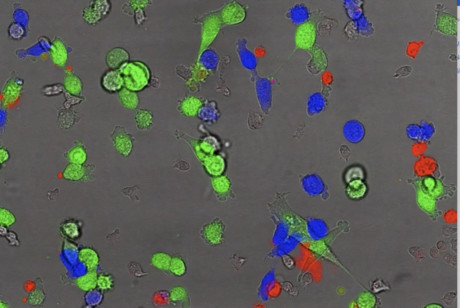'Bystander killing' eliminates rogue cancer cells

While investigating how tumours evade the immune system, Australian scientists have identified a potent and previously underappreciated way that cancer cells are destroyed — the inflammatory cytokine known as tumour necrosis factor (TNF).
TNF is naturally produced as a result of T cells being activated in response to cancer cells, viruses or other foreign invaders. The new study, led by Dr Jane Oliaro and Professor Ricky Johnstone at the Peter MacCallum Cancer Centre, highlights the importance of TNF in destroying cancer cells that may avoid being killed directly by the immune system’s T cells.
“T cells can directly kill cancer cells when they recognise antigens on the cancer cell surface, but they have another weapon in their arsenal, TNF, which may be very important in fighting cancer,” said Dr Oliaro, Head of Peter Mac’s Immune Defence Laboratory.
“Our study has revealed that the large amounts of TNF produced by T cells when they recognise a cancer cell causes widespread collateral damage to other cancer cells nearby. This means that TNF can kill rogue cells that either don’t have the antigen on their surface or are hidden from T cells deep within a tumour — a phenomenon we have coined ‘bystander killing’.”
The study saw the Peter Mac researchers develop a whole-genome gene editing screening process using CRISPR methodology to identify key genes and molecular pathways that are important for cancers to evade the immune system. This involved individually deleting all 20,000 genes in the genome in cancer cells and testing which ones, when missing, allow cancer cells to evade T cell killing.
Using a number of different cancer cells and approaches, genes involved in sensitivity to TNF were unanimously the top hits in the screens. The results were published in the journal Science Immunology.

“This whole-genome CRISPR screening process has shown us when tumours evade the immune system, a major reason for this is acquired resistance to TNF killing,” said Professor Johnstone, Peter Mac’s Executive Director of Cancer Research.
The discovery opens a potential new pathway for developing drugs to harness the anticancer powers of TNF, particularly to boost the effectiveness of other immunotherapy drugs. Work is already underway at Peter Mac on testing a drug that could sensitise tumour cells to TNF, which could help extend the results that the latest immunotherapy drugs are showing to other solid cancers — and ultimately improve the number of patients that respond to this promising new therapy.
Damaged RNA, not DNA, revealed as main cause of acute sunburn
Sunburn has traditionally been attributed to UV-induced DNA damage, but it turns out that this is...
Multi-ethnic studies identify new genes for depression
Two international studies have revealed hundreds of previously unknown genetic links to...
Oxygen deprivation may contribute to male infertility
Medical conditions that deprive the testes of oxygen, such as sleep apnoea, may be contributing...



